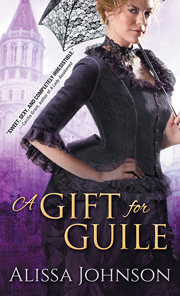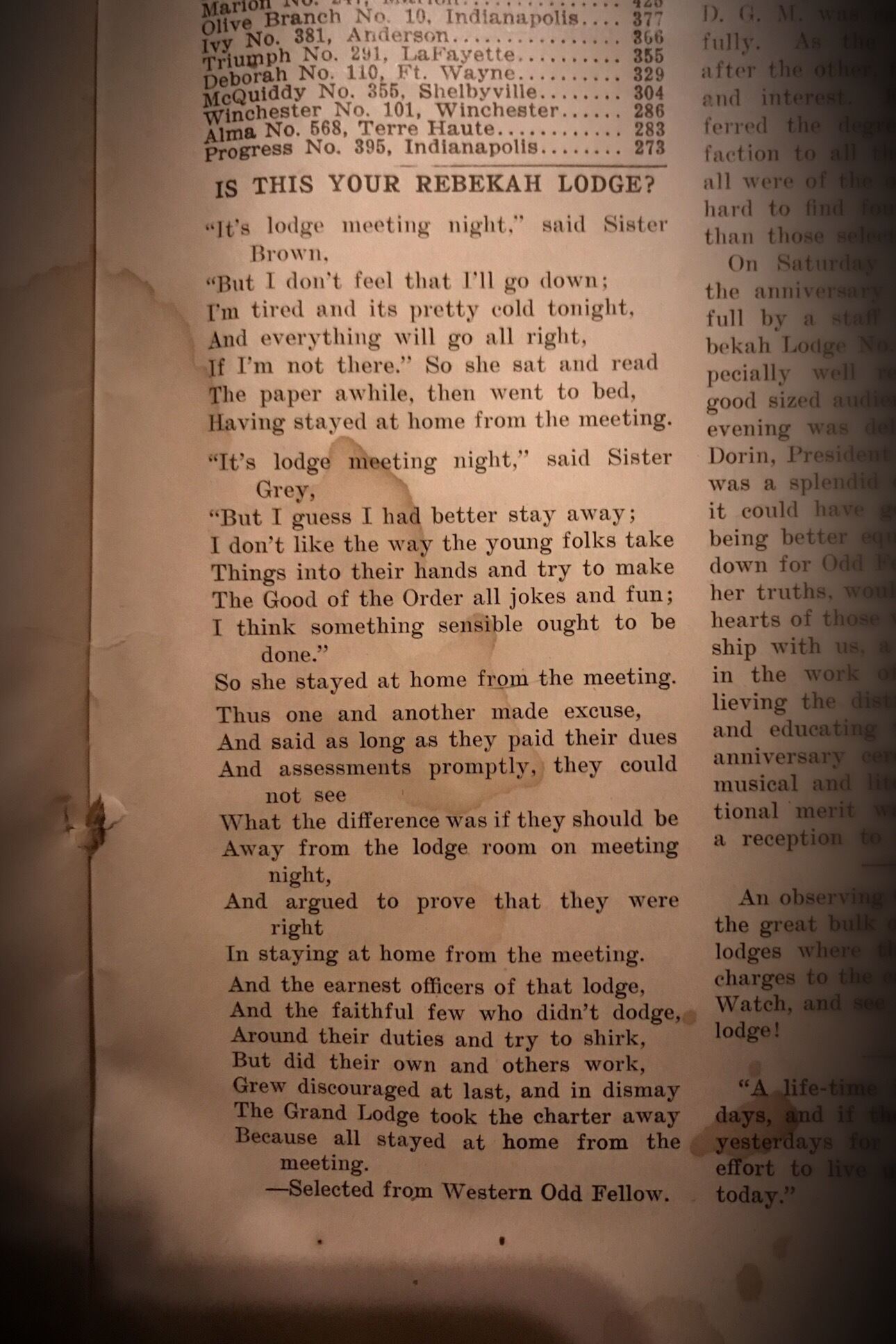 Miss Bates positively reviewed the first volume of Alissa Johnson’s Thief-Takers series, A Talent For Trickery. However, it was glimpses of the hero and heroine of the present volume, A Gift For Guile, that she anticipated. Guile‘s premise remains the same: three Victorian PIs’ lives are interwoven with the thief-turned-police-informant Will Walker’s family. Walker was killed when he and the three PIs rescued a kidnapped duchess and retrieved her jewels. To Walker’s family, however, two daughters and a son, his death was blessing and curse. Walker manipulated and used them, especially the girls, and yet, for all intents and purposes, with a mother who abandoned them, he WAS their family. A Gift For Guile is the story of the daughter who, Miss Bates suspects, suffered the most damage from Will Walker’s machinations and dishonesty, Esther Bales-Walker. Will used Esther to thieve and trick. When the present novel opens, Esther, known to police and therefore in danger of being identified and caught, is in a London train station, awaiting a meeting with a mysterious young man who claims to have information about her family. The young man has revelations about Esther’s parentage and Esther is compelled, despite the ever-present danger of discovery, to find out what they are. Until, into the station and her life, again walks private investigator (and nemesis), Sir Samuel Brass and said mysterious young man runs away. Samuel and Esther embark on a quest to find him and the truth behind Esther, her mother, father Will Walker, and her origins.
Miss Bates positively reviewed the first volume of Alissa Johnson’s Thief-Takers series, A Talent For Trickery. However, it was glimpses of the hero and heroine of the present volume, A Gift For Guile, that she anticipated. Guile‘s premise remains the same: three Victorian PIs’ lives are interwoven with the thief-turned-police-informant Will Walker’s family. Walker was killed when he and the three PIs rescued a kidnapped duchess and retrieved her jewels. To Walker’s family, however, two daughters and a son, his death was blessing and curse. Walker manipulated and used them, especially the girls, and yet, for all intents and purposes, with a mother who abandoned them, he WAS their family. A Gift For Guile is the story of the daughter who, Miss Bates suspects, suffered the most damage from Will Walker’s machinations and dishonesty, Esther Bales-Walker. Will used Esther to thieve and trick. When the present novel opens, Esther, known to police and therefore in danger of being identified and caught, is in a London train station, awaiting a meeting with a mysterious young man who claims to have information about her family. The young man has revelations about Esther’s parentage and Esther is compelled, despite the ever-present danger of discovery, to find out what they are. Until, into the station and her life, again walks private investigator (and nemesis), Sir Samuel Brass and said mysterious young man runs away. Samuel and Esther embark on a quest to find him and the truth behind Esther, her mother, father Will Walker, and her origins.
From this initial moment of their re-acquaintance, Esther and Samuel verbally spar in clever, witty, awesomely entertaining, banter. Johnson pens a wonderful opening sentence and it stands as an example of her ability to capture the reader with witty turns of phrase, humour, and the delicious suggestion of impending hero-heroine conflict:
“Hello.” Quite possibly the single most innocuous word in the whole of the English language. It was difficult to take exception to the word hello under nearly any circumstance. Unless, of course, it happened to be uttered in the wrong place, at the wrong time, by the wrong man – in which case that one simple word spelled disaster. Esther Walker-Bales stood amid the bustling crowd of Paddington station. For several long seconds, she did nothing but stare through the thick crepe of her weeping veil at Sir Samuel Brass. All six feet, three and a half enormous inches of him.
Johnson’s set-up is so well done: droll tone, the suggestion of confrontation, and the hero’s entry, so big and mysterious. The reader wants to know what makes Sir Samuel Brass the LAST person our heroine wants to see.
The hero and heroine’s differences are based on prejudice and a sense of their personal failings. Samuel, for example, makes assumptions about Esther’s criminality, “Esther never set aside the Walker customs of trickery and guile for long. And for some reason, that bothered him to an unreasonable degree.” Inherent in this sentence is the intimation that Samuel’s mistrust is bound up with attraction. Esther, on her part, feels Samuel’s judgement and it infuriates her: “Samuel was a presumptuous, maddening, dictatorial arse.” And yet, Esther is vulnerable to Samuel’s prejudice. While Samuel assumes Esther is in London for nefarious reasons, Esther actually yearns to be someone else, to put off her family’s dastardly reputation. She feels this particularly because she knows that Samuel comes from better beginnings and has lived a morally upright, judicious life, “How could she possibly explain to the son of a vicar what it meant to wish for a better father and a better life?” What Esther doesn’t realise is that Samuel has a weakness for her. He does see her as capable of being better, but he is short and temperamental with her because, of course, he’s likes and wants to protect her.
Esther’s and Samuel’s interactions are hilariously antagonistic. They have staring contests, shouting matches, and poke and prod at each other. Nevertheless, through it all, Johnson shows us how they see the best in each, acknowledge their prejudices and errors, and come to understand and appreciate their opposing viewpoints. They come to agree and reconcile. Johnson shows a developping, believable romance in two most sympathetic protagonists.
Some of the most important moments in any romance are those wherein the hero, particularly, shows he pays attention to the heroine (not because he’s listening to what she says, though that might be a part of it too) by showing her that he knows what she wants, needs, and/or loves. It’s the preamble to the offering of the self, the most essential and vulnerable moment of the romance narrative. In Samuel’s case, Miss Bates adored his and Esther’s first dinner because Samuel ordered asparagus :
“You’re fond of asparagus, I believe.”
“Yes. How did you know?” He pulled out his own chair and began removing the other lids.
“You mentioned it.”
“I did? When?”
“Last year. On the twenty-eighth of June.” She stopped midreach for her napkin.
“That is very specific.”
“I’ve a keen memory.” He remembered the exact date she made an offhand comment about asparagus. That wasn’t keen. That was … Well, she didn’t know what that was, except disconcerting.
Esther and Samuel go on like this, stumbling along in the emotional dark, trying to understand each other and loving each other in a most marvelous fashion, by accruing, with affectionate humour and wit, knowledge about the other. Johnson exemplifies this theme in Samuel’s gift-giving: he keeps getting gifts wrong for Esther until he … doesn’t. These moments of “I know you” in the romance narrative are the glimmers the reader needs to make her way through the darkest moments: the low moments when the hero and heroine hurt, misunderstand, and betray each other.
There is really not much wrong with Alissa Johnson’s A Gift For Guile. It’s about growth, understanding, forgiveness, and healing. It’s about two wonderful, wounded-but-not-broken people learning to love each other, not madly, but as equals, forging a life that will be lived fully together. And, it’s also laugh-out-loud funny. Miss Bates will indulge in a bit of spoiler, so please skip it if you prefer, but here’s the almost-HEA:
“I have something for you,” Samuel said.
At the same time she blurted out, “Will you marry me, Samuel?” His brows lifted and his eyes went wide.
“I beg your pardon?”
“Oh.” Oh dear. “I didn’t mean to skip so far ahead.”
“I imagine not. Care to continue?”
This is how most of Esther and Samuel’s exchanges go: aren’t they great?! Truth be told, Miss Bates thought Samuel “doth protest too much” when it came to playing the alpha-protector and, like A Talent For Trickery, Guile did get a little draggy, but not nearly as much. It’s lovely and worth reading and Miss Bates hopes you do because she has the impression Johnson’s Guile didn’t get the rom-critical love it deserved. She and Miss Austen, however, say that in Johnson’s romance “there is no charm equal to tenderness of heart,” Emma.
Alissa Johnson’s A Gift For Guile is published by Sourcebooks Casablanca. It was released in July 2016 and is available at your preferred vendors. Miss Bates received an e-ARC from Sourcebooks Casablanca, via Netgalley.
Do you recall masterful moments of recognition in the romances you’ve read, dear reader (like Samuel’s asparagus)? Miss Bates would love to hear about them in the comments.
- More





